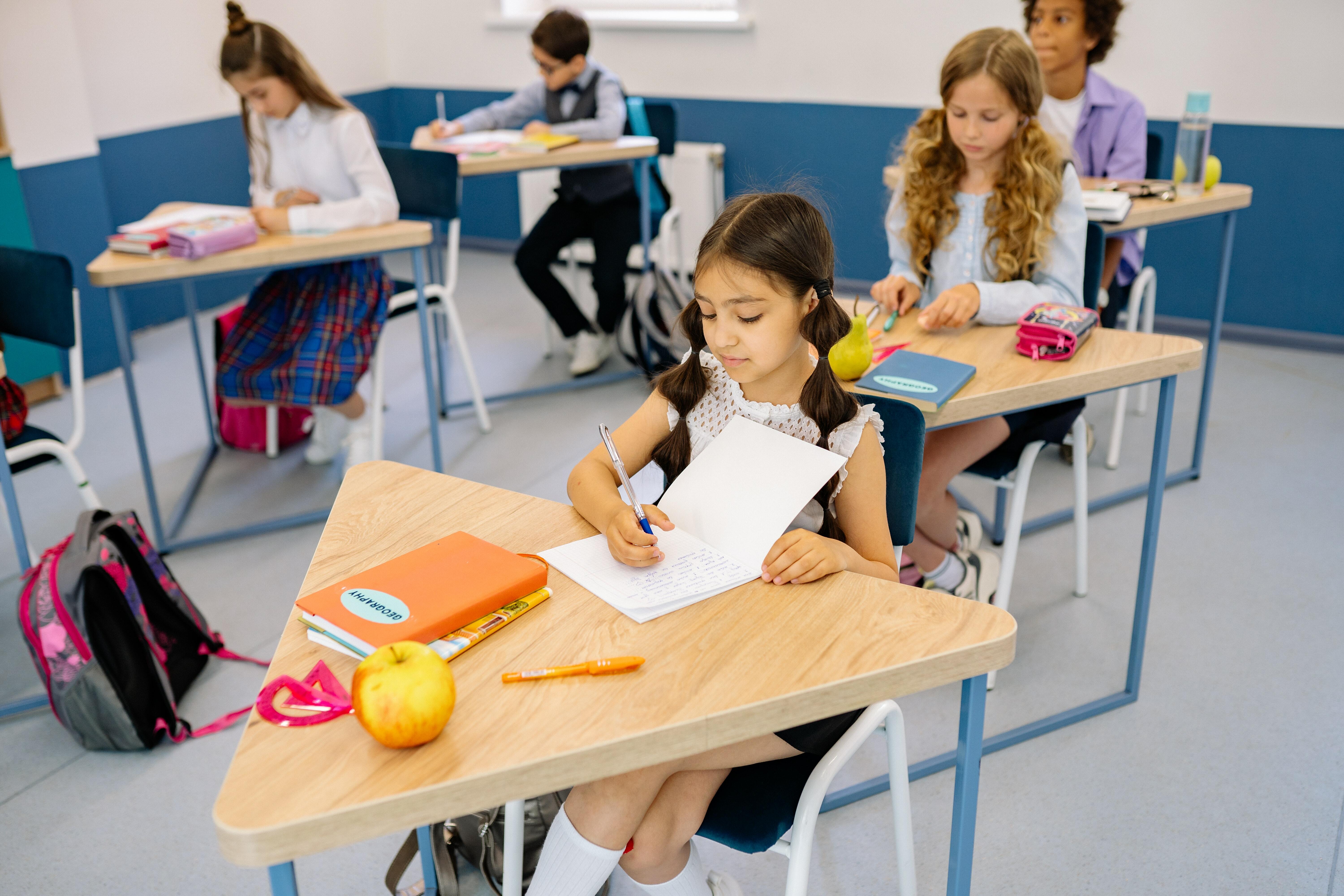- Understanding the Transition from Homeschooling to Public School
- Navigating the Bureaucracy: What Schools may Ask for
- How Well Are Homeschoolers Academically Prepared for Public School?
- Understand That Accreditation Does NOT Guarantee High School Credit Transfers
- Social Preparedness: Are Homeschooled Kids Ready for Public School Environment?
- The Importance of Support: Homeschool Organizations as Information Resources
Stepping from the cozy realm of homeschooling back into the bustling corridors of public school in Texas? Buckle up because this educational rollercoaster is full of twists and turns.
At Great Homeschool Conventions, we're your navigational star, guiding you through this exhilarating transition. Picture this blog post as your treasure map, revealing the secrets and shortcuts to ease your journey from homeschooling back into the Texas public school system.
So, let's discuss this adventure together, discovering what awaits and ensuring that your family's educational voyage remains smooth and exciting.
Understanding the Transition from Homeschooling to Public School
Adjusting to a new learning environment can be challenging for homeschoolers. The transition from homeschooling to public school requires understanding the differences in teaching methods and curriculum. Homeschooled students may face social adjustments when transitioning to a public school setting. They may need time to adapt to public school's structured schedules and routines. However, open communication between parents, teachers, and students is essential during the transition.
One of the main challenges homeschoolers face when returning to public school after homeschooling in Houston Texas is adjusting to a new learning environment, especially for students in kindergarten. In homeschooling, students can learn independently and within their comfort zones.
However, in public schools, they are placed in a classroom with other students and follow a structured curriculum. This adjustment can be difficult for homeschoolers who are used to the freedom and flexibility of homeschooling. For older students, such as those in 11th grade, the transition can be challenging as they may have already established their routines and academic goals.
At Great Homeschool Conventions, we understand the unique challenges homeschooling families may face during this transition, and we are committed to helping you navigate this journey successfully.

Transcript of Records and Diploma
As you prepare to transition your child from homeschooling to public school in Texas, one important document you will need is a transcript of records. This document provides an overview of your child's academic achievements and serves as a transferable record for their new educational institution.
To create a comprehensive transcript, it's essential to include all relevant information that showcases your child's educational journey. Start with a clear header that provides for your child's name, contact information, and the date of the transcript. Then, outline the subjects and courses your child has completed during their homeschooling years.
In addition to a transcript of records, another important document you may need when returning to public school after homeschooling in Texas is a high school diploma that meets the graduation requirements. While not always required, having a diploma that fulfills the graduation requirements can provide a sense of accomplishment for your child and can also be helpful when applying for college or future employment opportunities.
To create a homeschool diploma, you can design a certificate that reflects your child's achievements and educational journey. Include their name, the date of completion, and any relevant honors or awards they have received during their homeschooling years. Also, consider personalizing the diploma with your child's interests and hobbies, making it a truly unique representation of their homeschooling experience.
Why Some Families Choose Returning to Public School After Homeschooling in Texas
There are various reasons why families choose to transition from homeschooling to public school. Some may seek additional socialization opportunities, access to specialized programs, or the convenience of a traditional school setting. At Great Homeschool Conventions, we celebrate the diverse educational choices families make, and we are here to support your decision, providing resources and guidance no matter which path you choose. Understandably, some families may feel hesitant about returning to public school after homeschooling for a while.
Navigating the Bureaucracy: What Schools may Ask for
When transitioning from homeschooling to public school, it's important to be prepared for the bureaucratic requirements that may come your way. Schools often ask for documents and information to ensure a smooth enrollment process. One of the common requests is documentation such as homeschool transcripts or portfolios, which are essential homeschool records. Like a homeschool portfolio, these records provide a glimpse into your child's academic journey and help the school determine the appropriate grade placement
Additionally, it is beneficial to speak with the guidance counselor to ask whether homeschool credits, including tuition, are transferrable and to find out documents you may need if your child decides to enroll during their high school years. This will help ensure a seamless transition and provide the necessary information.

In addition to academic records, immunization records are typically required for enrollment in public schools. This is an essential step to ensure the health and safety of all students. Schools may also request proof of grade placement, such as standardized test scores, to assess your child's academic level and determine which classes they should be placed in if they are of high school age.
It's noteworthy that different states and school divisions may have specific enrollment forms or procedures for homeschooled students. Familiarizing yourself with the local school district and division requirements is crucial to ensure a smooth transition. This may include filling out specific forms, providing additional documentation, or following certain procedures outlined by the state, district, or division.
Returning to public school after homeschooling in Texas, you can send either a withdrawal email or letter to the principal, counselor, and attendance clerk letting them know that you are officially withdrawing your child and sharing the date your homeschooling will begin (or begin).
Additionally, you may encounter unexpected expenses when enrolling in a public high school, such as fees for various items and materials. For example, an expensive graphing calculator may be required for algebra, and there may be a need to purchase books for certain classes if the school does not provide them.
The Role of State Requirements and School Assessments in Grade Placement
State requirements and school assessments play a crucial role in determining the grade placement of students returning to public school after homeschooling in Houston, Texas. These factors can significantly impact where a student is placed and how their academic progress is evaluated.
In Texas, for example, state law may influence the grade placement of homeschooled students entering public school. The Texas Education Agency has guidelines and requirements that schools must follow when admitting homeschooled students. These requirements ensure that students receive an appropriate education and are placed in the right grade level.
Schools often use various assessments, such as placement tests, to determine grade placement. These tests assess a student's knowledge and skills in different subjects and help determine their grade level.
Additionally, previous academic records, including homeschool transcripts, may be taken into consideration. These records provide valuable information about the student's past academic achievements and can help guide grade placement decisions.
Collaboration between parents, students, and school officials is essential in determining the best grade placement for homeschooled students. It allows everyone involved to share insights, discuss the student's strengths and weaknesses, and make informed decisions. By working together, they can ensure that the student is placed in a grade level that matches their abilities and sets them up for success in the public school system.
How Well Are Homeschoolers Academically Prepared for Public School?
The academic preparedness of homeschooled kids for public school varies. They often possess independent, solid learning skills and excel in subjects they focus on. However, adjusting to the structure and pace may take time. They may provide support to help homeschooled students catch up academically.
Being "Ahead" or "Behind": Managing Academic Differences
Homeschooled students may have varying levels of academic advancement compared to their peers when they return to public school after homeschooling in Texas. Some homeschooled students may be ahead academically in certain subjects, thanks to the individualized instruction and flexibility of homeschooling.
On the other hand, there may also be homeschooled students who feel behind academically due to gaps in their education. It is important to prepare your student for the fact that they may be ahead or behind in certain subjects because your homeschool curriculum, even curriculum from corresponding grade levels, won't exactly match the school's 8th-grade curriculum. However, there are also stories of disappointment, where students who would typically have been in 10th grade or later were required to retake lower-grade courses at public school after learning the material at home.
Fortunately, schools are equipped to address these academic differences. For academically advanced students, they can offer advanced coursework or enrichment opportunities to keep them challenged and engaged. This allows them to continue building on their existing knowledge and skills.

Additionally, teachers can provide individualized instruction to close any academic gaps that homeschooled students may have. Teachers can tailor their teaching strategies by identifying the areas where extra support is needed.
Schools can provide additional resources such as tutoring programs or extra support for homeschooled students who feel behind academically. These interventions can help them catch up to their peers and bridge educational gaps. Parents, students, and teachers must maintain ongoing communication to ensure that the appropriate level of support, including speech therapy, physical therapy, occupational therapy, or reading services, is provided.
This collaboration will help create a more seamless transition and ensure that the academic needs of homeschooled students, as outlined in their Individualized Education Program (IEP), are met.
Understand That Accreditation Does NOT Guarantee High School Credit Transfers
When homeschooled students decide to make the transition to public school in Texas, they may experience varying levels of academic advancement compared to their peers. Some might find themselves ahead academically in certain subjects, thanks to the personalized instruction and flexibility of homeschooling. Others, however, might feel a sense of lag due to potential educational gaps. It is important to note that graduation from homeschool at the high school level is considered to be "equivalent to graduation from a public high school" in Texas.
Therefore, homeschooled students must be treated "according to the same general standards" as other students when considered for college admission. This ensures that homeschool graduates at the high school level are eligible to apply to colleges or universities without any disadvantage. The school district also has no authority to approve curricula used by private schools.
Read more about the differences in regulating private schools and homeschools in Texas at the United States Department of Education website.
Thankfully, schools are well-equipped to address these academic differences. Schools can offer advanced coursework or enrichment opportunities for those who excel academically to keep them engaged and challenged. This allows them to build upon their existing knowledge and skills, ensuring a smooth return to public school after homeschooling in Texas.
On the other hand, for homeschooled students (and private school students, for that matter) who feel they have fallen behind academically, schools can provide various resources to help bridge any gaps in their education.
One important step in closing academic gaps is identifying areas where extra support is needed. Teachers can work closely with these students to assess their strengths and weaknesses, allowing them to tailor their teaching strategies accordingly.
This personalized approach ensures that each student receives the individual attention they need to succeed.
Social Preparedness: Are Homeschooled Kids Ready for Public School Environment?
Adjusting to the social dynamics of public school can be a new experience for homeschooled kids. Encouraging extracurricular participation and open communication with teachers can address any social challenges.
Overcoming the Perceived Disadvantages
Returning to public school after homeschooling in Texas may come with perceived disadvantages, but these challenges can be overcome with the right mindset and support. Great Homeschool Conventions is dedicated to providing practical solutions and encouragement for families facing these obstacles, sharing success stories to inspire confidence in your educational choices.

Returning to public school after homeschooling in Texas may seem like a daunting transition, but rest assured that plenty of opportunities are available to keep your child engaged and challenged. Public schools offer a wide range of programs and initiatives designed to build upon your child's existing knowledge and skills, ensuring a smooth reintegration into the classroom environment.
For homeschooled students who feel they have fallen behind academically, schools can provide various resources to help bridge any gaps in their education. Teachers can work closely with these students to identify areas where extra support is needed. This personalized approach allows for tailored instruction and targeted interventions, helping homeschooled students catch up and thrive in the public school setting.
Public schools also offer a wealth of extracurricular activities that can help homeschooled students develop their social skills and find their place within a larger community. From sports teams to clubs and organizations, these opportunities allow students to meet new friends, explore their interests, and build valuable life skills.
Furthermore, public schools in Texas prioritize individual attention for each student. Teachers are trained to recognize every child's unique needs and strengths, ensuring that they receive the necessary support and guidance to succeed academically and personally. With smaller class sizes, teachers can provide more one-on-one interactions, allowing them to understand each student's learning style better and adapt their teaching methods accordingly.
Returning to public school after homeschooling in Texas is also a chance for personal growth and development. By being exposed to a diverse group of peers, your child will have the opportunity to learn from different perspectives and experiences.
This exposure can broaden their horizons, foster empathy, and enhance their understanding of the world.
Dealing with Emotional Changes During the Transition
Returning to public school after homeschooling in Texas can bring about emotional changes for students. It is not uncommon for homeschooled students to experience feelings of anxiety or stress as they adjust to the new environment. Fortunately, schools often offer counseling or support services to help these students navigate the emotional challenges that may arise during this transition. Parents also play a crucial role in providing their children with a supportive and understanding environment.
Encouraging open communication is key in helping homeschooled students express their feelings and concerns. By creating an atmosphere where students feel comfortable sharing their emotions, parents can better understand and address any difficulties their children may face.
Additionally, schools can assist in this process by fostering an environment that promotes open dialogue between students, teachers, and counselors.
During this transition, it is essential to remember that every student is unique and may have different emotional needs. Some homeschooled students may embrace the change effortlessly, while others may require more time and support. The important thing is to be patient and empathetic towards their emotional journey.
By acknowledging and addressing the emotional changes that may occur during returning to public school after homeschooling in Texas, parents and schools can provide the necessary support to ensure a smooth adjustment for students.
With proper guidance and resources, homeschooled students can overcome any emotional challenges and thrive in their new educational setting.
The Importance of Support: Homeschool Organizations as Information Resources
Homeschool organizations provide support and resources for families transitioning from homeschooling to public school. These organizations serve as valuable information resources, offering guidance on enrollment procedures and requirements. They understand the unique challenges homeschooled families face and can provide the necessary assistance to make the transition smoother.
Connecting with other homeschool families who have already left public school for the first time can provide a wealth of support and advice. Homeschool organizations often facilitate these connections, creating a community where families can share their experiences and learn from one another. This network of support can be invaluable in navigating unfamiliar territory.

In addition to guidance and peer support, homeschool organizations are well-equipped to provide information on local support groups and educational resources for homeschool parents with special needs. They have extensive knowledge of the resources available within the community.
They can direct families to programs and services that align with their needs, such as specialized educational programs for special needs children. Whether it's finding extracurricular activities, tutoring services, specialized educational programs, or CPS-related information, homeschool organizations can offer valuable insights to ensure a smooth transition.
By utilizing the expertise of homeschool organizations, families can ease the process of returning to public school after homeschooling in Texas. These organizations have a deep understanding of the challenges faced by families, and they can provide tailored advice and resources to address specific concerns.
From understanding state laws and regulations to navigating the system's complexities, homeschool organizations can guide families every step of the way.
Conclusion
In conclusion, returning to public school after homeschooling in Texas is a significant decision that can bring both rewards and challenges.
At Great Homeschool Conventions, we are committed to being a valuable resource for homeschooling families, no matter their path.
Please explore our website for additional resources and information to support your educational journey.

 Resources
Resources
 Curriculum
Curriculum
 Workshop Sessions
Workshop Sessions

